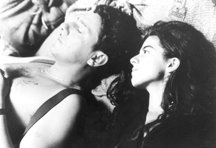
Casting for Compliments: A traveling talent scout (Sergio Castellitto) schemes on a lush new prospect (Tiziana Lodato)
Giuseppe Tornatore's 'The Star Maker' delivers a sour moral about the movies
By Richard von Busack
The new film by Giuseppe (Cinema Paradiso) Tornatore, The Star Maker, starts innocently enough, only to turn into an acrid metaphor for a lifetime of moviemaking. For the first hour or so, it's a pleasing picaresque, full of fascinating villages. In the movie's most charming moment, one town is lovingly explored with a long tracking shot. But when the hero, a major fraud, gets his inevitable payback for hustling Sicilian rubes, the movie slides into dour tragedy.
Dr. Joe Morelli (Sergio Castellitto) is an alleged talent scout of the early 1950s who rides the dirt-poor back roads of Sicily with a sound truck, a camera and a tent. He's supposedly seeking the kind of faces movies are made out of and conducting screen tests for a Roman studio. But his camera is full of expired film, and he's actually just scamming fees from the various villagers. During Morelli's early adventures, The Star Maker has a spring to it. True to his cover, Morelli finds all types of movie-struck humanity. His hopefuls even rewrite the audition lines of Rhett and Scarlett according to their own personal humors. "I'm from the South, and not even death can stop me," says one romantic. "Give it to me, Scarlett," demands a mafioso.
In trying to fit an American style over the Sicilian moods, Morelli is ignoring what will be Italy's most enduring film gift to the world: the naturalist cinema. In the early sections of the movie, the important thing, as far as Tornatore is concerned, is that we see the villagers and take in their stories, among them, an ancient man who was one of the last of Garibaldi's Redshirts, and who, with great effort, manages to croak out, "We'll hang the last king with the guts of the last priest." We also hear the confessions of a small-town homosexual and, finally, the yearnings of a stunning young woman named Beata, who has been raised as a scrubber in a convent and who throws her unconditional love at Morelli.
Beata (Tiziana Lodato) may be built "like a statue," as an admirer says, gazing at her nude body (she's stripped to earn Morelli's fee); unfortunately, she acts like a statue, too. Lodato continues the proud cinematic tradition of eyeball-ravishing beauties who can barely cross from stage right to stage left. And she's further petrified by being forced to function as the film's conscience, redeeming Morelli enough so that he'll be in the right spirit to be punished. She has help in the redemption business. Mastropaolo (Franco Scaldati), a policeman whom Morelli defrauds, returns to arrest the Star Maker--and to underscore with a little speech what we've already understood about how the man with the camera was throwing away records of people's souls. Tornatore combines Catholic and Marxist consciences, and he lets Morelli have it with both barrels. Ultimately, when the film turns from confection to medicine, you wonder why. True, Morelli has exploited desperate people, but moviemakers do that every day--and movie lovers tend to forgive them for it.
The Star Maker (R; 105 min.), directed by Giuseppe Tornatore, written by Tornatore and Fabio Rinaudo, photographed by Dante Spinotti and starring Sergio Castellitto and Tiziana Lodato.
[ Metro | Metroactive Central ]
